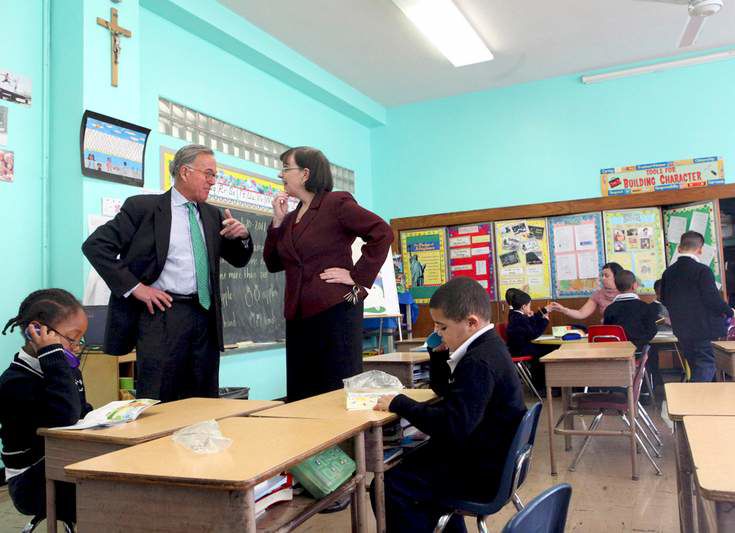Wealthy donors want a bigger voice in Catholic schools
Published 4:00 am Monday, February 7, 2011

- Charles Durkin, a Wall Street financier, talks with Joanne Walsh, principal of Our Lady Queen of Angels School, during a school visit in New York City last month.
Private philanthropists have changed the face of public education over the last decade, underwriting the rise of charter schools and promoting remedies that rely heavily on student testing and teacher evaluation. But with much less fanfare, wealthy donors have begun playing a parallel role in the country’s next-largest educational network: Roman Catholic schools.
In New York — as in Boston, Baltimore and Chicago — shrinking enrollment and rising school deficits in recent years have deepened the church’s dependence on its cadres of longtime benefactors. Donors have responded generously, but many who were once content to write checks and attend student pageants are now asking to see school budgets, student reading scores and principals’ job evaluations.
In the jargon of education reform, they want transparency and accountability; and though the church bureaucracy has resisted similar demands from other constituents in the past, the donors are getting pretty much what they want.
To the delight of some educators and the discomfort of others, major contributors have won a voice in decision-making at every level, from the staffing of the schools to the frank financial self-examination that has nudged the Archdiocese of New York toward the most severe school consolidation in its history.
Church officials announced last month that falling enrollments and rising deficits would force them to close 27 schools, one-tenth of their total, by the end of this academic year.
“The relationship between the church and its contributors used to be basically, ‘Pray, pay and obey — give us money, we’ll take it from there,’” said Francis Butler, president of Foundations and Donors Interested in Catholic Activities, a national network of Catholic philanthropies.
“But donors are much more proactive today. They are concerned about the quality of the schools, the leadership; they’re drilling down into these problems.”
$100,000 donation
At Our Lady Queen of Angels School in New York, a Wall Street financier, Charles Durkin, and a small group of fellow benefactors have donated a total of roughly $100,000 a year for about 15 years.
Until about five years ago, the extent of their involvement was to visit several times each year and shake hands with grateful children, as Durkin, 72, did one recent morning.
Yet the next day, Durkin followed up with a long working meeting, poring over test scores and talking with the principal about the progress she was making with the students.
When they were done, the two agreed that teachers might need some coaching in math instruction — and Durkin agreed to pay for it.
The principal of Our Lady Queen of Angels, Joanne Walsh, has embraced what she calls the contributors’ “financial and moral support.”
However, her predecessor, Roman Pitio, who contends he was replaced about five years ago at a benefactor’s urging “because our test scores weren’t going up,” described the relationship between donors and educators as “a bit of a Faustian bargain.”
“I had these guys walk through the building once and tell me, ‘Get rid of this teacher,’” Pitio said. “I mean, maybe they mean well, but they’re from another world.”
Durkin and several hundred other wealthy contributors, most of them from Wall Street, have long been a quiet but essential part of the New York archdiocesan schools.
By various estimates, their donations and scholarships total $15 million to $20 million annually — nearly matching the $23 million the archdiocese provides in subsidies to all of its 270 schools.
Russell Carson, a billionaire venture capitalist who has been a major contributor for more than a decade, said that donors’ demands for more information were based on an emerging desire to “make sure we were getting a good return” on a sizable investment.
‘Venture philanthropy’
Experts say the donors’ increasing assertiveness is partly a reflection of a new ethos in giving of all types.
“The new thing is ‘venture philanthropy,’ where you apply the principles of venture capitalism to achieving the goals of philanthropy,” said Diane Ravitch, a New York University professor and author of “The Death and Life of the Great American School System.” “The mentality of Wall Street favors consolidation and downsizing,” she said. “The sense of the larger mission can get lost.”
Catherine Hickey, who was superintendent of the archdiocesan school system from 1988 to 2007, said she was always grateful for donors’ financial help. “But at the same time,” she added, “these are very strong-willed people, used to making decisions and used to having their way. At times, the decisions they wanted us to make were based on good business judgment, but not necessarily on sound educational principles.”






